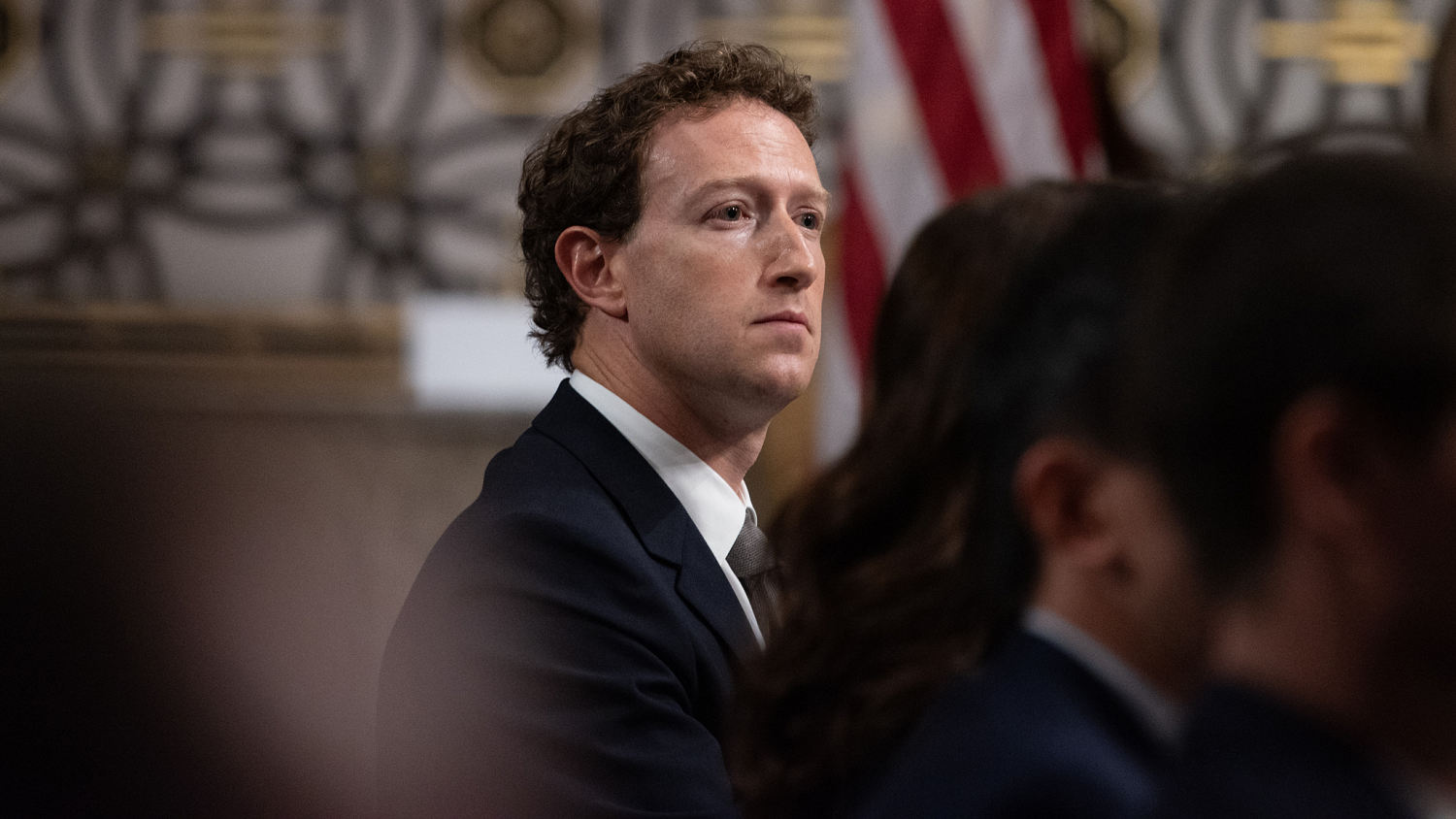Don’t expect Mark Zuckerberg to save social media

Mark Zuckerberg still doesn’t get it. This week, the billionaire owner of Meta announced that he was doing away with fact-checkers in a supposed move “towards once again prioritizing speech” at Facebook and Instagram. With or without fact-checkers, though, Zuckerberg will still be the one deciding the rules for what billions of people can see and say every day online. That’s the real problem, and no amount of tinkering with his company’s content moderation policies will solve it. We need congressional action, instead.
Zuckerberg’s latest move comes at a politically convenient moment. Throughout the Biden administration, conservatives complained that social media companies had altered or enforced their content moderation policies to “censor” right-wing viewpoints. That complaint has now become a rallying cry of the incoming administration, with President-elect Donald Trump vowing to “dismantle the censorship cartel.”
This narrative of platform “censorship” has always been controversial, in part because what critics call censorship is, as the Supreme Court said last year, the exercise of the platforms’ own First Amendment rights to decide what speech they want to promote. It’s speech, in other words, not censorship, at least as far as the First Amendment is concerned.
Still, it is true that the platforms have often enforced their policies to suppress legitimate political discussion. There are countless examples to choose from, including pro-Palestinian speech, LGBT content, the origins of the COVID-19 pandemic, and, at least briefly, the Hunter Biden laptop story.
While the platforms’ private decisions to delete or demote political posts are protected by the First Amendment, it’s understandable that many believe those decisions to be censorial and dangerous to our democracy.
In fact, they are. But not quite for the reason that many commentators, or Zuckerberg himself, seem to think. The problem isn’t that the platforms have the power to suppress speech. The problem is that the platforms’ decisions to do so are so consequential — because of the platforms’ size.
When a small internet forum adopts a policy about the kind of speech it wants to host, not many people notice. But when a platform with billions of users decides to tilt debate on its services in favor of one political viewpoint or another, that decision really matters, because it has the potential to distort public discourse and to tear at the fabric of representative government.
The point is that centralized power over speech is hazardous, whether it’s the government or private corporations pulling the levers. It leads to a kind of groupthink in our political thought and expression. And it creates chokepoints in our conversations that can be exploited to tamp down on dissent. We should all be concerned, then, that the power to determine what ideas gain traction in our society is now concentrated in the hands of a few powerful billionaires.
Zuckerberg’s latest announcement seems to acknowledge this problem, but his proposal is no solution to it. In a video released on Facebook, Zuckerberg said that the social media platforms he owns would no longer rely on fact-checkers in deciding whether to take down or deprioritize false posts. This move, he said, would prevent “censorship” and reverse “the mission creep that has made our rules too restrictive and too prone to over-enforcement.”
The problem with Zuckerberg’s new policy is that it would do nothing to address the platform’s dominance. He will still be the one deciding who can join Facebook and Instagram, and what they can say. And he will still be the one determining which postings to amplify and which to demote. Today, he has decided to permit more political speech on his platforms. But yesterday, he allowed less, and tomorrow he could change course again.
It’s crucial to understand that there is no “neutral” policy for speech on these platforms. Even if you believe that the platforms should allow everyone to say anything they like, someone has to decide how to prioritize those posts in each user’s newsfeed. And that decision about sequencing is in many ways even more important than the decision about what kinds of speech to allow — because it determines which content actually spreads on the platforms, and because it is largely invisible (and therefore largely unaccountable) to the public.
Unfortunately, the real fix for social media is not one that Zuckerberg or any other tech CEO is likely to give us. We need to dilute their power over our speech, but proposals like Meta’s most recent seem designed only to distract attention away from that fact.
How do we dilute the platforms’ power? We need regulation. Congress could, for example, force the platforms to be “interoperable,” so that users from one platform could communicate with users of another. This would allow users of, say, Facebook to talk with users of other platforms, preventing the kind of lock-in that insulates the companies from competition.
Congress could also enact a privacy law that gives users more control over their own data, or it could buttress the authority of the Federal Trade Commission to protect user privacy. Doing so would make it easier for users to take their data to new platforms and harder for the platforms to amass that information in the first place. And Congress could pass transparency laws that would make it easier for journalists, researchers and the public to study the platforms and expose whatever harms they cause.
These interventions would not solve all of the problems of social media, but they would address the core problem of concentration. They would allow for the emergence of many, smaller platforms, which would promote a social media ecosystem that is more diverse and resilient.
With more platforms, we would see more experimentation with the rules for our speech, rather than a relatively homogenous set of amplification policies designed to further enrich a handful of billionaires. A more diverse social media ecosystem would be harder for governments to pressure into submission. And smaller platforms would be more responsive to the needs of their individual users.
To be sure, Zuckerberg and the owners of the other platforms could voluntarily put in place some of these reforms themselves. They could decide to make their platforms more like Bluesky or Mastodon, which already give their users far more control over their experiences online. But nothing about the dominant platforms’ past stewardship of social media suggests that we should hold our breath any longer. So long as a few billionaires hold onto the reins of social media, we’ll still be living in their world.
Alex Abdo is the litigation director of the Knight First Amendment Institute at Columbia University.
-

Mark Zuckerberg sends Trump a friend request
And the L.A. wildfires have already become politicalBBC News - 1d -

The coming battle between social media and the state
Behind the alignment of X and Meta with Trump is a cold business logic — and a position of weakness rather than strengthFinancial Times - 1d -

The uncomfortable truth about social media networks
It may be impossible to run an uncensored network while presenting an environment where anyone can feel safeFinancial Times - 2d -

How Mark Zuckerberg pivoted Meta to the right
Meta CEO Mark Zuckerberg said Tuesday that he was ending professional fact-checking on Facebook and Instagram.NBC News - 3d -

Mark Zuckerberg’s Political Evolution, From Apologies to No More Apologies
Meta’s chief executive has stepped away from his mea culpa approach to issues on his platforms and has told people that he wants to return to his original thinking on free speech.The New York Times - 4d -

A new era of lies: Mark Zuckerberg has just ushered in an extinction-level event for truth on social media | Chris Stokel-Walker
The Meta boss’s decision to end Facebook and Instagram’s factchecking program has set the stage for a fact-free four years online. Social media has always acted as something of a funhouse mirror to ...The Guardian - 4d -

Why did Mark Zuckerberg end Facebook and Instagram’s factchecking program?
The social media giant enters a more partisan political era as its CEO pursues Donald Trump’s approval. Meta is shifting to the right, following the prevailing political winds blowing through the ...The Guardian - 4d -
Mark Zuckerberg announces end of fact-checking program for Meta
Meta’s CEO Mark Zuckerberg announced in a video that its platforms, including Facebook and Instagram, will no longer implement a fact-checking policy, instead relying on community notes similar to ...NBC News - 4d -
Beamer, Bielema continue feud on social media
South Carolina coach Shane Beamer and Illinois coach Bret Bielema continued their exchange Wednesday on social media after several testy moments during Tuesday's Cheez-It Citrus Bowl.ESPN - Jan. 1
More from The Hill
-

GOP rep suggests California relief aid should be withheld over state policies
Rep. Warren Davidson (R-Ohio) said he believes Congress should withhold disaster relief funds from California in the wake of Los Angeles wildfires until environmental policy changes are made by the ...The Hill - 4h -

LA County supervisor pens letter to Trump asking him to visit wildfire damage
The Los Angeles County Board of Supervisors Chair urged President-elect Trump to visit the burning region in a Friday letter to the incoming leader. “I've sent a letter to President-Elect ...The Hill - 5h -

Trump announces newest White House aide nominees
President-elect Trump announced several new picks for White House positions in a series of Saturday Truth Social posts. Early in the evening, the incoming president said Steven Gill Bradbury would ...The Hill - 8h -

Democrats debate strategy, voter protection at first candidate forum
Democrats evaluated candidates for party leadership at their first virtual candidate forum on Saturday with a focus on the Southern region. The highly contested race for DNC chair forced contenders ...The Hill - 8h -

House Republicans face massive debt problem
House Republicans have a problem. They want to pass a massive agenda for President-elect Trump, preferably in his first 100 days of office. And they don’t want to add to the federal deficit. That ...The Hill - 9h
More in Politics
-

GOP rep suggests California relief aid should be withheld over state policies
Rep. Warren Davidson (R-Ohio) said he believes Congress should withhold disaster relief funds from California in the wake of Los Angeles wildfires until environmental policy changes are made by the ...The Hill - 4h -

LA County supervisor pens letter to Trump asking him to visit wildfire damage
The Los Angeles County Board of Supervisors Chair urged President-elect Trump to visit the burning region in a Friday letter to the incoming leader. “I've sent a letter to President-Elect ...The Hill - 5h -

Growing anger over government response to wildfires
There is growing anger and questions over the response to the wildfires. Los Angeles’ Fire Chief even saying budget cuts lead to a lack of resources. NBC News' Ellison Barber reports.NBC News - 7h -

Trump announces newest White House aide nominees
President-elect Trump announced several new picks for White House positions in a series of Saturday Truth Social posts. Early in the evening, the incoming president said Steven Gill Bradbury would ...The Hill - 8h -

Democrats debate strategy, voter protection at first candidate forum
Democrats evaluated candidates for party leadership at their first virtual candidate forum on Saturday with a focus on the Southern region. The highly contested race for DNC chair forced contenders ...The Hill - 8h